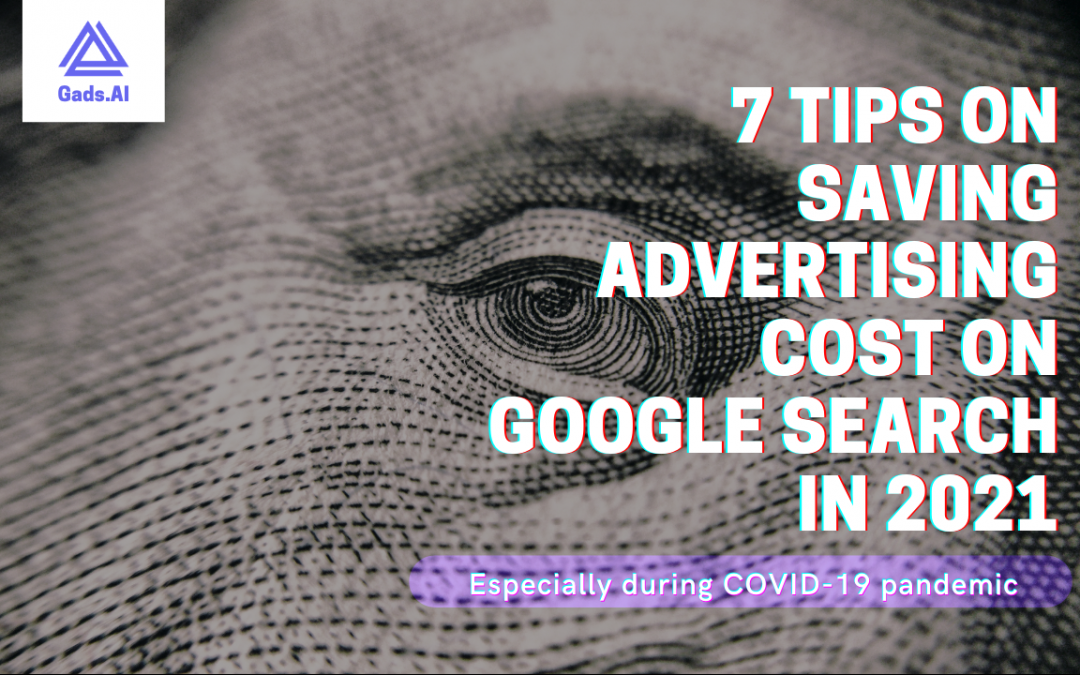7 tips on how companies can save advertising costs on Google Search in 2021
(Especially during COVID-19 pandemic)
It is always a common discussion among many search engine marketing managers how they can run their Google campaigns more efficiently. With the COVID-19 pandemic around the world, there are many businesses around the globe seeking recommendations on how to save some of their advertising spend on Google. Here we have a few tips for you!
1 – Choose the right bid strategy that matches with your goal
You may have different campaigns with different goals. Make sure your bid strategy reflects it. If you can share your revenue with Google, then use a bid strategy related to it, for example tROAS or Maximize conversion values. That is a very helpful strategy to help your campaign stay efficient.
2 – Exclude underperforming audiences
If you identify underperforming segments in your account, make sure you are excluding from your campaigns. For example, if you find out Google is showing your ads on the Google ads network, but it’s not performing, that’s a segment to exclude. Another example could be if you identify some audiences keep clicking on your ads and never make any conversion, you can also create an audience list and exclude them from your campaigns.
3- Make sure the targeting setting is right
Sometimes marketing managers make changes in the account and forget about it, or if you have a few different people managed the campaigns before. It is always good to have a quick audit, to make sure the targeting settings are right, whether it is the language, or the location, or hours that your ad is showing up.
4 – Create synergy between organic and paid search
Let’s say you already have some keywords that perform very well organically and you see there is not much competition. You can test not bidding for these keywords and monitor the SERP. One good example will be your brand keywords. In most cases your organic ranking should be very high, and if no one is bidding on your brand name, you can try to stop advertising spend. But make sure you monitor it closely to make sure if any competition shows up, you are quick to react and don’t lose those customers. (And this is where Gads.AI can help you! Check out here).
5 – Make good use of Google extensions to maximize exposure
In addition to having the best creatives, sometimes marketers may overlook the different extensions over there. Extensions are assets that can help you expand your creative space on the SERP. Therefore it is especially important you implement and test out different extensions that are clickable (meaning they can link customers to a certain part of your website). Some examples are sitelink, promotion or price extension.
6 – Keep track of keywords that drive most of your traffic
You may have a lot of keywords in your campaign, but remember the 80/20 rule. Focus on the keywords that drive 80% of your revenue, and make sure you are on top of it. If the CPC starts going up, you will know it. When more competitors start bidding on the keyword, you will know about it. If your top performing keywords don’t convert as good as the past, you will know about it. Knowing it is the beginning to make sure you can optimize and adjust your campaigns when necessary. (Check out how Gads.AI can help you tracking proactively!).
7 – Consider shifting your advertising budget to different channels
What we mean here is to reconsider your channel mix, look at the numbers again, and let them help you to decide your budget. Instead of spending your budget on low performing campaigns in Google, perhaps you can shift them around and invest more on other good performing campaigns in other channels.
How Gads.AI help you?
You can set up monitoring with us for keywords that you like, and we monitor the SERP for you actively and regularly using our technology. We will let you know who is bidding on those keywords, how their ads look like and anyone including the keywords in the ad text. So you can take actions if you need!
We will let you know:
- Which advertisers are bidding on your selected keywords
- How do their ads looks like
- What landing page they land their users to
- How often do your competitors show up for your selected keywords
- What’s their position
Get in touch and request a consultation today!

